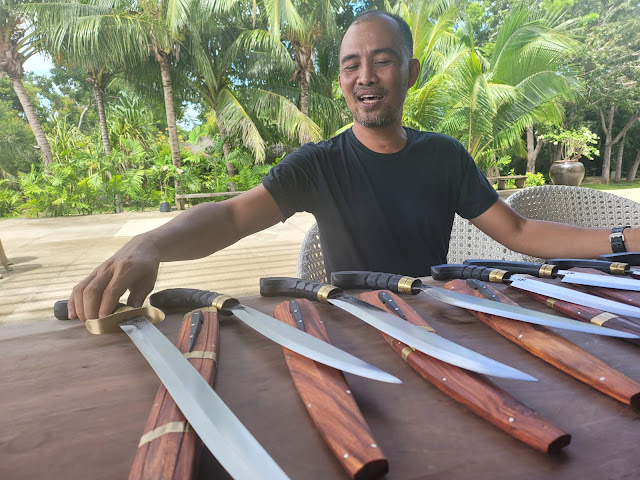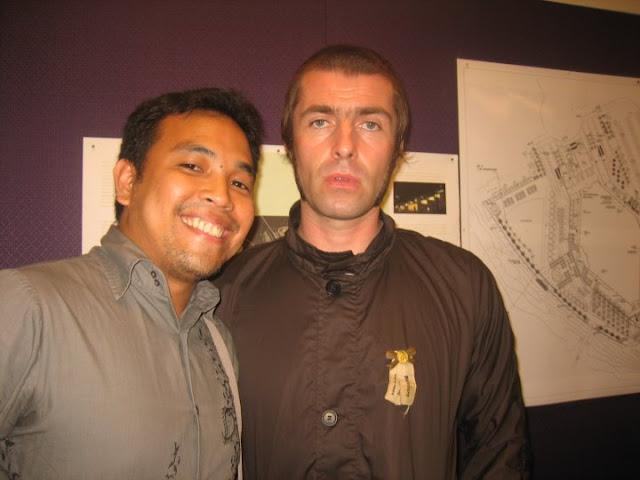.jpg) |
| Summiting Mt. Sinai in Egypt |
I wanted to be a writer since I was 10 years old. I know this because that’s the age I started keeping a journal. I still have those old notebooks somewhere, but I shudder to think what I was writing about back then. (Probably something painfully mundane like what happened at school that day or my latest altercation with one of my siblings).
I remember being part of the editorial team of my grade school paper, and then again in high school. Some people have asked if I wrote for the Collegian in university, and the answer is no, I didn’t, and I don’t know why. But I do remember co-writing the banner story for the paper we produced for our Journ 104 class (Newswriting or Newspaper Production, or something like that). It was about the CPDP, or the Commonwealth Property Development Project, which was a hot topic that many students were railing against at the time. ‘Prayer or Presidentiable Only Ways to Stop CPDP,’ UP President Says was the headline. I also wrote a couple of feature stories inside.
 |
| Taking Abby for a weekend stroll |
After university my first job was in advertising because a friend at the time convinced me to join her as she sent in applications to all the big agencies. I got hired before she did, which I felt surfaced feelings of resentment because she was the one who so badly wanted to get a job in that industry in the first place. It was a short stint for me though; I knew next to nothing about advertising (even though it was part of the curriculum in school) and I worked as a junior media planner that involved a lot of numbers and Excel sheets, which I knew even less about. I was outta there in less than a year.
I kicked around and did a few odd jobs for a few months—writer for a PR agency, PA for a TV show on a UHF channel, and even a collections agent for a multinational bank (haha)—before landing a job doing grunt work in the news department of a giant TV network. Even then I continued to find outlets for my desire to write. I submitted an unsolicited essay to an editor of the country’s top music magazine and asked if I could contribute; she took a chance on me and said yes. In between extended shifts at work I found time to write CD reviews, attend gigs, and interview local music acts. I also started a blog, which I updated quite regularly with a more grown-up version of those notebook journals from when I was a kid.
 |
| Took me a few months to finish this book |
I stayed at the network for six years but I knew it wasn’t where I wanted to be, and the job wasn’t the thing I wanted to be doing for the rest of my days. I went through a phase where I imagined myself working in the foreign service and even briefly considered going back to school to study International Relations. And so I quit to work as a staff member of a foreign embassy in Manila. I had a great boss and met some nice people, and the pay was actually pretty decent, but again, the job itself just wasn’t for me.
I heard about an opening for an editor for a magazine and decided to try my luck, submitting as sample articles mostly the stuff I wrote for the music title. The salary was less than half of what I was getting at the embassy, but I took the plunge anyway because, finally, I felt this was the job where the thing I wanted to do and the thing that I felt I was actually good at, finally converged. It was never about the money (although having it certainly made things a lot easier).
 |
| One of my favorite stories that I did this year was when I visited this religious colony in Cebu |
 |
| A few months later, I was back in Cebu and did a story on the vendors of the hundred-year-old Carbon Market, who claim they were being displaced by the redevelopment project |
I stayed in the company for eight years; the first two with a men’s title, and the last six for a luxury and society magazine. In 2015, the opportunity to work for the local franchise of an international business title—which was under a competing publishing company—presented itself, and, although I felt rather safe and contented in my cushy old job, I decided to shake things up one more time.
At Forbes Philippines I worked under one of the industry’s best and was surrounded by colleagues who were no slouches themselves (we’re talking award-winning journalists). More than the prestige of being part of the pioneering team of a globally recognized title, it was learning firsthand from industry heavyweights that I appreciated most about that initial foray into slightly unfamiliar territory. Too bad the magazine lasted only a couple of years. But my boss recruited me to be part of a new team that would run Entrepreneur Philippines, and I accepted, if only for the privilege of working with and learning from him even more.
 |
| In Bohol, I met Mang Nestor, who is one of the last makers of asin tibuok in the island |
 |
| Also in Bohol, I met Cid, who runs a blademaking enterprise |
 |
| I interviewed Atom Araullo for this year's Man at His Best awards |
But the target has always been Esquire. And given my professional trajectory up until this point, you’d understand why I felt that it made sense that I would end up here. The path may not have been a straight line, but, on hindsight, I’m grateful for all those detours because every single one prepared me for where I am now.
To me, Esquire has always been about smart, relevant, and insightful content that actually adds something to your life instead of simply stealing your time. It’s a platform that reflects the interests of a person—man, woman, and everything in between—who is always striving to become better versions of themselves. Heck, this is a magazine that has published works by giants of modern-day literature—Ernest Hemingway, F. Scott Fitzgerald, Raymond Carver, Truman Capote, and Stephen King. Naturally, when the magazine made its debut locally, it provided space for the words of our own literary royalty—writers like Butch Dalisay, Krip Yuson, Jessica Zafra, Sarge Lacuesta, and many others.
 |
| Vietnam was my first overseas trip after the pandemic |
 |
| A few weeks later, I found myself going for the first time to New Delhi, India |
 |
| And one week later, I was walking the streets of Manama, Bahrain |
I do not claim to be at the level of these distinguished men and women of letters, nor do I fancy myself as some maverick out to change the course of a title that has existed since before World War 2. But I do feel I bring something to this gigantic potluck dinner that so many others have brought appetizing flavors to over the years—a thoughtfulness and sensibility shaped by years in attendant industries, professions, and publications. Everything I studied in school and every job I had before this were all just a rehearsal for the main event. You can say I spent my whole life getting ready for this job and I can only hope I don’t mess it up.
To be EIC of a publication today isn’t what it used to be. And, certainly, being EIC of a digital publication isn’t the same as that of a print title. The job description covers much more than developing a content strategy and seeing it through to execution; the basics are there, for sure, but it’s simultaneously much more wide-ranging and nuanced, covering aspects that vary wildly from what an EIC had to deal with 10 or 20 years ago. You don’t need me to tell you how much the landscape of media and the consumption habits of audiences and consumers have changed in the last decade or so, and those pose a different set of challenges—and opportunities—for existing platforms like Esquire. It’s tough but exciting work, and while some days are more stressful than others, the fact that every day is a little bit different than the last (sometimes a lot different) is reason enough to be grateful. (That I work with a pretty stellar team that could hold their own with some of the best in the business is a very welcome bonus).
 |
| Egypt was the trip of a lifetime |
 |
| And going there with friends made it all the more special |
Naturally, I acknowledge the furrowed brows and surreptitious stares from those who might question my credentials and scoff at my perceived abilities. But I’d like to think the days of second-guessing myself and crippling impostor syndrome are behind me; or, at least, I’ve brought those down to manageable levels. Besides, if the powers-that-be believe I’ve earned the honor, then that’s all the approval I need. I’ll let my work speak for itself.
That said, I do acknowledge that I stand on the shoulders of the great men and women who have come before me as stewards of this venerable publication and am grateful for the opportunity to take it further. I understand the gravity of this position and not for a second do I take it for granted. My team and I intend to tell more stories that go beyond the painfully mundane and will strive to offer deeper, more meaningful insights on issues that affect Filipinos in the world we live in today. In this iteration of the magazine, the focus is on meaningful storytelling: hopefully the kind that can inspire others to take pen to paper (or fingertips to keyboard), just like I did all those years ago.
There’s more to come from Esquire Philippines and I hope you join us for the ride.
 |
| Here's to the year ahead |
PJ Caña
Editor-in-chief
Esquire Philippines
27 December 2022




